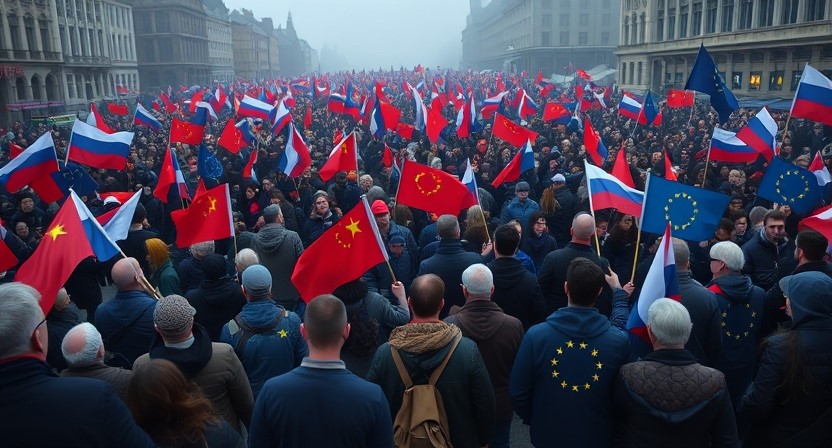Views: 53
It is your responsibility to fight injustice.
Frans Vandenbosch 方腾波 14.01.2025

The Tools of Influence
Do not waste energy combating the media, politicians, or academics directly. They are merely instruments through which the true power brokers—those operating behind the scenes—exercise their control. Engaging in debates about these tools is unproductive and distracts from addressing the root causes of societal decline [1].
If you are part of a service club, a political organisation, or manage a blog or news website, avoid getting drawn into discussions about these intermediaries. Such debates are often futile and create the illusion that freedom of speech remains vibrant and effective. In reality, they serve as little more than a pastime for keyboard activists, diverting attention from the deeper issues at hand.
Instead, focus on the underlying causes of the current malaise: the erosion of democratic principles in the West, the loss of cultural values, and the fragmentation of social cohesion. These are the real challenges that demand our attention. While we debate superficial issues, the true power brokers continue to operate unchallenged, steadily consolidating their influence and shaping the future to their advantage.
Tackling Systemic Issues Through Unity and Accountability
The global order is increasingly shaped by the destructive consequences of American hegemony and imperialism, which have led to widespread instability, proxy wars, and organised interventions under the guise of promoting “democracy” [2]. Instead of uniting against these systemic issues, individuals and groups often engage in divisive debates over media, politics or other minor differences, fragmenting their impact and diverting attention from the root causes of global unrest. This tendency to fight among ourselves rather than address the larger issues not only weakens collective action but also allows oppressive systems to remain unchallenged. To effectively combat the harmful effects of American exceptionalism, it is essential to shift focus from internal squabbles to unified, strategic efforts aimed at dismantling these structures [3].
Empowering the next generation is a critical step in this process. Educating young people on how to recognise and challenge the mechanisms of American imperialism equips them with the tools to drive meaningful change [4]. Practical steps such as identifying key issues, building coalitions, and advocating for policy reforms can transform awareness into action. Mentorship and structured guidance play a vital role in fostering civic engagement, ensuring that young activists are prepared to tackle systemic bias effectively. By investing in their development, we create a foundation for sustained progress [5].
However, the responsibility for combating American hegemony does not rest solely on the shoulders of marginalised communities or future generations. Citizens of wealthy, powerful nations must also acknowledge their role in perpetuating global instability. The expectation that the Global South should lead the fight against imperialism is not only unrealistic but also unjust, as these nations often bear the brunt of exploitation [6]. Those who benefit most from the status quo—particularly in the West—have a moral obligation to challenge the systems that sustain it. This includes holding governments and corporations accountable for their actions and advocating for policies that promote global stability [7].
It is not the task of China or Russia
It is not on China, Russia, Iran or another state to combat American hegemony, imperialism, or exceptionalism. These nations have their own challenges and priorities, and expecting them to bring harmony and peace to the world is both unrealistic and unfair. The primary perpetrators of wars, unrest, and global instability are mostly rooted in the United States, where policies and actions have far-reaching consequences. Therefore, it is unreasonable to expect the BRICS+ nations to arrest or convict those responsible for these global issues. The burden of addressing these problems lies with those who benefit from the current system and have the power to change it—namely, Westerners, and especially Americans [8].
Ultimately, addressing the devastating impact of American hegemony requires a multifaceted approach that prioritises unity, education, and accountability. By focusing on systemic issues rather than second tier actors, empowering individuals to take action, and recognising the responsibilities of privileged societies, we can create a more stable and equitable world. The fight against American imperialism is not the burden of a few but the collective duty of all, and only through coordinated, sustained efforts can we hope to achieve lasting change [9].
Thank you for reading! We’d love to hear your thoughts—please share your comments here below and join the conversation with our community!
Endnotes
1. Andy Gill, “How We Fight Each Other Instead of Combatting Injustice,” *Patheos*, accessed October 2023, [https://www.patheos.com/blogs/andygill/how-we-fight-each-other-instead-of-combatting-injustice/](https://www.patheos.com/blogs/andygill/how-we-fight-each-other-instead-of-combatting-injustice/).
2. John Mearsheimer, *The Great Delusion: Liberal Dreams and International Realities* (New Haven: Yale University Press, 2018), 45-67.
3. Girl Scouts of the USA, “Instead of Saying ‘Life’s Not Fair,’ Teach Her How to Fight Injustice,” accessed October 2023, [https://www.girlscouts.org/en/raising-girls/leadership/civic-action/how-to-fight-injustice.html](https://www.girlscouts.org/en/raising-girls/leadership/civic-action/how-to-fight-injustice.html).
4. Henry Giroux, *The Terror of Neoliberalism: Authoritarianism and the Eclipse of Democracy* (Boulder: Paradigm Publishers, 2004), 89-104.
5. Caitlin Johnstone, “It’s Not The Responsibility Of The Global South To Bring Down The Empire. It’s Ours.,” *Caitlin Johnstone*, 12 January 2025, [https://caitlinjohnstone.com.au/2025/01/12/its-not-the-responsibility-of-the-global-south-to-bring-down-the-empire-its-ours/](https://caitlinjohnstone.com.au/2025/01/12/its-not-the-responsibility-of-the-global-south-to-bring-down-the-empire-its-ours/).
6. Noam Chomsky, *Manufacturing Consent: The Political Economy of the Mass Media* (New York: Pantheon Books, 1988), 12-45.
7. Vijay Prashad, *The Darker Nations: A People’s History of the Third World* (New York: The New Press, 2007), 112-135.
8. Chalmers Johnson, *Blowback: The Costs and Consequences of American Empire* (New York: Henry Holt and Company, 2000), 78-95.
9. Naomi Klein, *The Shock Doctrine: The Rise of Disaster Capitalism* (New York: Metropolitan Books, 2007), 201-220. .



My journalism has helped educate hundreds of fans over the years, who have contacted me with thanks opening their horizons.
Therefore, I don’t consider my work without value.
You are of course right. However it seems to be a Hercules job. As older people we have had our chance, now our influence on the younger generation is very limited. Censorship is an efficient tool cementing realities. Most communities do not provide the social glue they ussed to offer in former times. Whoever dares to express a position incongruent with the mainstream narrative is labelled and outcast. This has even been true within unions, all kinds of associations, parties… And if you talk in metaphors, people won’t decipher.
How to measure the degree of democracy ? The level of education of a people and historic awareness is certainly one parameter, the absence of sheer misery, degree of homelessness, freedom to decide when and how to act another one, the trust of a people in their leadership another one…